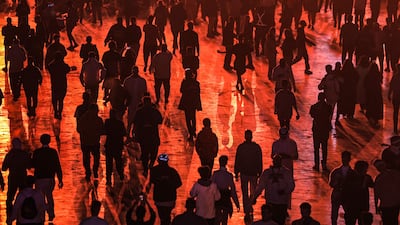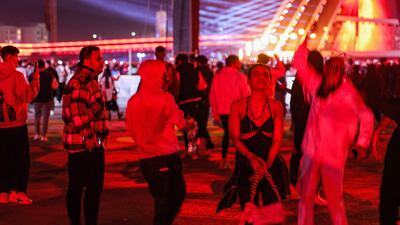Popular music is undergoing a remix.
After decades of global chart domination by western music acts, it is the sounds from markets previously considered emerging that are making waves internationally and shattering streaming records today.
This month singer Karol G's release Manana Sera Bonito became the first Spanish language album by a woman to top the US Billboard Hot 100 charts.

This comes on the back of Bzrp Music Sessions Vol 53, from fellow Colombian pop star Shakira and Argentine DJ Bizarrap, becoming the fastest Latin track to reach 100 million views on YouTube within two days of its January release.
Meanwhile, K-pop group BTS broke their own Guinness World Record to become the most streamed group on Spotify with 31.96 billion streams as of March 3.
African artists continue to make an international impact with Kwaku the Traveller by Ghanaian rapper Black Sherif becoming 2022’s most streamed song on the discovery app Shazam, while Afropop artists such as Nigeria's Burna Boy and Cameroon's Labianca are headlining major North American and European festivals.
With the centre of gravity seemingly moving away from the West, can Arab artists take advantage of the cultural shift?
School of dance
According to Saudi Arabian music company MDL Beast and dance music label Wall Recordings, the region is capable of following the likes of South African genre Amapiano and producing its own intoxicating sound that fills dance floors worldwide.
This is the premise behind the intensive five-day industry and production course, organised by both entities and held in Riyadh, Saudi Arabia, this week.
Nearly 20 aspiring and established Saudi DJs and producers converged at recording complex Merwas to immerse themselves in workshops and masterclasses led by Wall Recordings artists, including the label founder and EDM star Afrojack.
"Any region that has a distinct sound — whether it’s from the instrumentation to traditions — that people can relate to and recognise as their own has an audience. The question is how can we take that sound and popularise it to the rest of the world?” Matthew Dicks, MDL Beast's executive director of music and talent, tells The National.
“It is through the fusion of these traditional sounds with something modern, like electronic music, that has proven to be a documented success. Now, can we do that here? I don’t know but we will definitely try.”
Dicks describes the classes, known as the Wall Camp, as a music version of a hackathon.
“It follows the same principle of creating something new by breaking things apart,” he says.
“So we are hacking beats, music samples and elements of traditional music."
Such an approach resulted in some fascinating meetings of music minds throughout the week.

In his guest masterclass on Wednesday, Iraqi producer and composer Zaid Nadeem, who has scored Arab pop hits for the UAE’s Hussain Al Jassmi, Tunisian Saber Rebai and Morocco's Asma Lamnawar, explained why melding Arabic rhythms with western music styles can sound incongruous.
He says that Arabic music has too much compositional variety to easily fit within a modern pop music arrangement.
“Western music essentially follows two scales, which we know as the major and minor,” he says in the session, while illustrating his point on the keyboard.
“But with Arabic music we are talking about eight scales, which we call maqams, each of which has its own techniques and traditions.
“Arabic music also has distinct quarter-tone notes that are really tough to master if you are a non-Arab musician.
“This is why it is often used in a cliched way in western movies in scenes showing the Egyptian pyramids.”
When it comes to creating a fluid electronic music sound with a distinct Arabic element, Nadeem says producers first need to be familiar with the rhythmic characteristics of the region’s traditional folk music.
He points to the UAE’s Ayala and Saudi Arabia’ Samri genres as ripe for a remix due to its four-on-the-floor rhythm — a beat pattern widely adopted in western dance music from disco to techno.
Knowledge of self
Sharpening those skills only comes with an understanding of what it is to be a professional musician, according to Afrojack.
"You do need to understand certain concepts of the music industry," he tells The National after his Tuesday masterclass and ahead of his Riyadh concert as part of the Saudi Formula One Grand Prix on Saturday.
"By that I am talking about the business of marketing, staying true to yourself and how to ultimately position yourself as an artist."
These are all aspects that hit home with LeSad, one of three Saudi women attending the camp.
A trance DJ with a number of official recordings and host of Trance-Energy Radio online show RECignition, she credits Afrojack’s masterclass for encouraging her to be more accommodating to her audience.
"I am normally uncompromising when I play in shows or festivals, in that my set can be nothing but hard trance and techno. That sometimes scares people away from the dance floor," she says.
"So what I am learning here is not to be that stubborn about it.
“Afrojack encouraged us to try multiple genres. One of which is something that people would enjoy, and the other is a side project for ourselves.
“Hopefully if the more popular sounds genre takes off, I can then slowly bring that fan base to hear my other harder music."
Sound of acceptance
While such access to industry insiders is valuable for Saudi artists, can such a well-meaning yet clinical approach replace the drive and desperation propelling artists from South Africa and Puerto Rico to take their Amapiano and Reggaeton sounds to the world?
"What we are ultimately looking to do is to create a moment of inspiration. Maybe this wave of producers could come through with something or they could inspire the next wave to take the mantle forward," Dicks says.
"There are so many Saudi artists here who subtly worked underground and spent so long on the outskirts of what is happening internationally in music.
“Now they finally have an opportunity to compete and impress the world. There is the drive and desperation to be accepted by their peers and to proudly stand behind a sound they can call their own.”
















